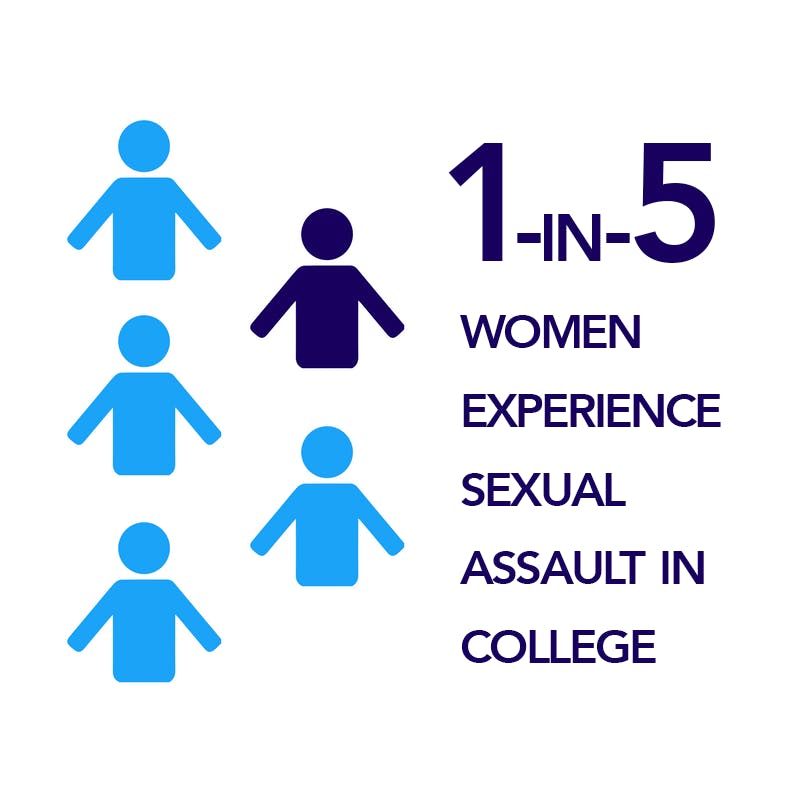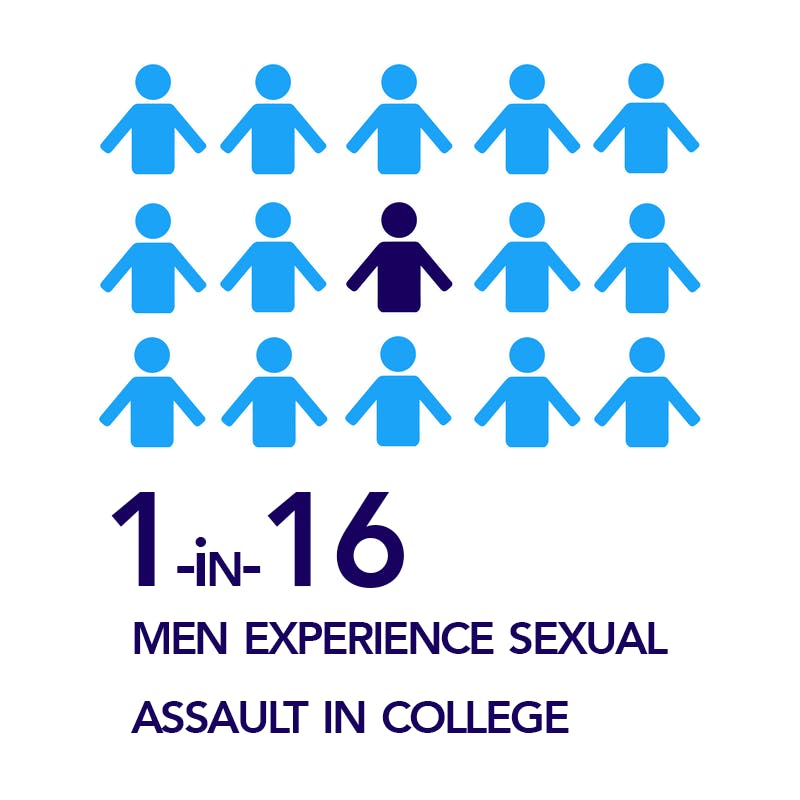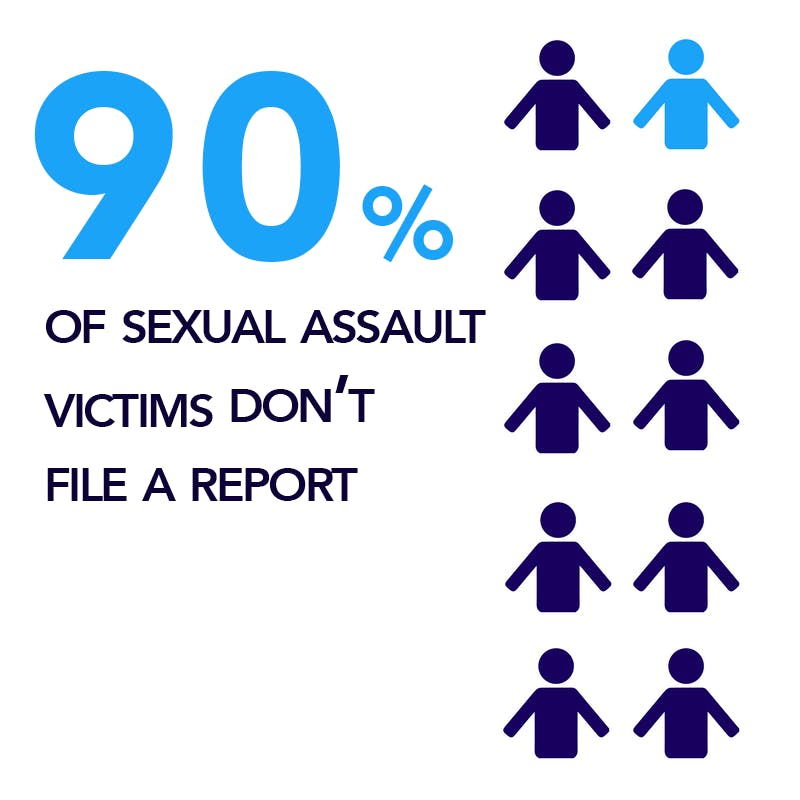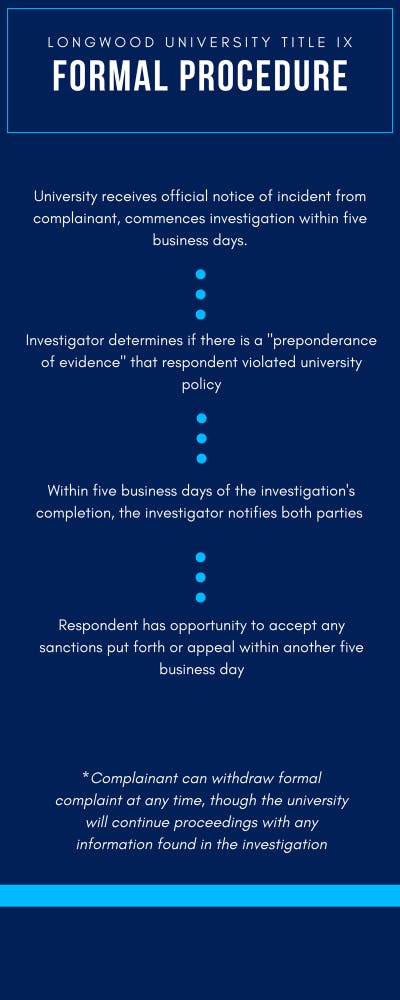“We had a young lady, and this was 25 years ago. She was in Curry Hall. She was abducted by a student, or what we believe was a student, held captive for a couple of days, sexually assaulted multiple times and eventually stabbed,“ said Longwood Police Chief Col. Robert Beach. And the university police department learned about the horrifying on-campus assault recently when the victim came forward about the event several years after it took place.
Immediately after the assault occurred, however, Beach said, "She never told the police about it, never told anyone about it. She went home and never came back (to Longwood)."

The National Sexual Violence Resource Center reported that one-in-five women experience sexual assault while in college.

The National Sexual Violence Resource Center reported that one-in-16 men experience sexual assault while in college.

The National Sexual Violence Resource Center reported that 90 percent of sexual assault victims don't report the incident.
While the severity of assaults vary, the incidents aren't uncommon. According to the National Sexual Violence Resource Center, one in five women and one in 16 men experience sexual assault while in college. Of those self-reported assault survivors, more than 90 percent elect to not report the assault.
Lindsey Moran, Longwood’s Title IX coordinator, estimated this semester alone she has received 32 reports of notice dealing with sexual assault or sexual misconduct.
“Of those 32 reports of notice, I’ve spoken with 15 students in person. (Eight or nine) of those students have done an extensive follow through,” Moran said.
Moran believes the media's attention toward sexual assault and the process that follows plays a role in the low number of survivors willing to file a complaint.
“This has been so prevalent in the news people are really hesitant to pursue a complaint because they see it as so overwhelming, and it is. It is a challenging process,” said Moran.
To address the complicated process, Longwood has a plethora of offices, staff members and resources for assault survivors to utilize in the aftermath of an attack. In many cases, the first step an assault victim may take when pursuing resources and options after an assault is reporting the assault.
Every staff and faculty member on campus is what is termed as mandatory reporter. According to Longwood Village Residence Education Coordinator (REC) Jarrell Miller, mandatory reporters “always have to respond if its Title IX, even if we get a little hint of it.”
Mandatory reporters are trained to make survivors aware of resources available to them on campus, from Counseling and Psychological Services to the Longwood University Police Department (LUPD), as well as report the sexual assault to the proper authorities, mainly the Title IX coordinator, on campus that can assist the survivors and assess their situations.


“We always encourage the residents if they are involved to go to an RA (resident assistant) with those things. The RA will take that report and then they always, always, always call the REC on call and we take that report. We talk to the student to get the whole A to Z kind of thing, and we contact our administrator to let them know what happened, how it happened, and who it was pertaining to. Then all our information will be forwarded to the Title IX coordinator,” Miller explained.

This graphic illustrates the basic steps taken in a standard Title IX case at Longwood University.
When she first receives a report of sexual assault, Moran said she sets up an information meeting with the student involved.
“The very first thing I say is ‘I’m very sorry this happened to you,’" said Moran. "It’s never easy to come in and talk to someone about a very difficult subject, so I do what I can to mitigate that."
Then she outlines the different paths a survivor can take, from filing a formal or informal Title IX complaint to involving the Longwood Police Department. By the end of the initial meeting, she said she gives the survivor time before a follow-up meeting to process the options.
In a formal complaint, Moran said it must "enumerate" the incident in writing, starting an investigation from the Title IX office.
When addressing an informal complaint, Moran organizes a mediation between the complainant and the respondent. “In the event that it wasn't a sexual assault, that it was something more along the line of minor harassment or behavior that is just really uncomfortable, but can be addressed head on with the respondent, that is another option," she said. "Obviously, nine times out of ten, it is not an option for an informal complaint because when I get to people it's a very serious sexual assault or sexual misconduct.”
As well as outlining the complaint options available to the survivor through the school, Moran makes sure that the student she’s meeting with is aware of all the resources available to them as well.
“We talk a lot about the variety of options on campus, the first meeting being an informational meeting. I always want people to take a step back and think about how they want to proceed. A lot of times we’re dealing with trauma, and a trauma based response to a lot of this takes some time to work through,” Moran said.
In terms of involving the police, Beach believed survivors should utilize this option right away.
“If I can convince victims to understand, cooperate with us and allow us to get every bit of information, we can do a full investigation, and you get to decide where you’re at from that moment what you want to do," he said. "That’s the ultimate responsibility of law enforcement, to provide justice to victims. We do what we can to get you justice."
He emphasized that a survivor needs to know that when they talk to the police, the complainant still maintains control over the situation.
“A person can lay out all the facts. ‘I was grabbed, I was dragged into a place, I was molested and sexually assaulted, and these are the people and this is was happened,' and then say, ‘but I don’t want to do anything about it," he said. "I want everyone to understand though, a victim always has the right to change their mind."
In the victim's case who recently came to LUPD, the lack of information due to the decision not to report early has caused issues with investigating the case. Beach said the department doesn't have any evidence aside from the recounted details form the victim which can be "clouded" over time.
"By allowing the police department to go in and conduct an investigation to the height we can, with the understanding that the victim can say ‘yes let’s go forward’ or ‘no let’s not,'" he said. Beach noted even if the victim decides against pressing charges initially, the case can be revisited in the future.
Another priority of LUPD, as with any other office on campus that deals with sexual assault, is to make sure the victim is safe and has every resource available at their fingertips.
“Victims come with all types of emotion, fear, embarrassment, anger, and we understand that. We want to make sure the victim has all the resources available to them, medically, emotionally, mentally," said Beach.
Academically, Moran says that she sees many students suffer after experiencing a sexual assault. To combat the issue, her office works with the student and faculty members to accommodate the student’s academic needs.
"When you’re dealing with sexual assault or sexual misconduct academics can take a back seat," said Moran. “You come to Longwood to go to college, so my goal is to keep you on track to get your degree."









